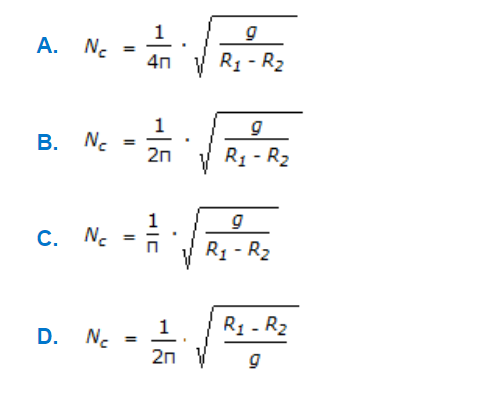Question

a.
A
b.
B
c.
C
d.
D
Posted under Basic Chemical Engineering
Interact with the Community - Share Your Thoughts
Uncertain About the Answer? Seek Clarification Here.
Understand the Explanation? Include it Here.
Q. Critical Speed (Nc) of a ball mill is given by(where R₁ and R₂ are radii of ball mill and the ball respectively).
Similar Questions
Explore Relevant Multiple Choice Questions (MCQs)
Q. Which of the following equations is Rittinger's crushing law ?
(where P = power required by the machine, m = feed rate, k = a constant, D̅sa & D̅sb = volume surface mean diameter of feed & product respectively.)
View solution
Q. About 2-3 hp, power per gallon of a thin liquid provides vigrous agitation in an agitator. 'Power number' in agitation is given by
View solution
Q. rpm of a trommel at critical speed is given by (where, D = Diameter of trommel in ft)
View solution
Q. A centrifugal filtration unit operating at a rotational speed of w has inner surface of the liquid (density ρL) located at a radial distance R from the axis of rotation. The thickness of the liquid film is δ and no cake is formed. The initial pressure drop during filtration is
View solution
Q. Half the angle of nip, (α), for a roll crusher is given by (where, dr, dp and df are diameters of crushing rolls, feed particles and rolls gap respectively).
View solution
Q. Critical speed of rotation, N (in rps - rotation per second) of a trammel is equal to (where, g = acceleration due to gravity = 9.81 m/sec² and, r = radius of trammel, metre. )
View solution
Q. The basic filtration equation is given as in the below figure, where, V is volume of the filtrate ; A is the filtration area, a is specific cake resistance, μ is viscosity of the filtrate, and C is the concentration of the solids in the feed slurry.
In a 20 minutes constant rate filtration, 5 m³ of filtrate was obtained. If this is followed by a constant pressure filtration, how much more time in minutes, it will take for another 5 m³ of filtrate to be produced ? Neglect filter medium resistance, Rm ; assume incompressible cake.
View solution
Q. __________ mean diameter of particles is given by
View solution
Q. The specific surface of spherical particles is given by (where D and ρ are diameter and density of particle).
View solution
Q. Velocity of a small particle of diameter 'Dₚ' at a distance 'r' from the rotational axis of a cyclone rotating at an angular speed 'ω' is given by (the other symbols are as per standard notation)
View solution
Q. Pick out the correct statement.
View solution
Q. The cummulative mass fraction of particles smaller than size dⱼ for a collection of Nᵢ particles of diameter dᵢ and mass mi (i = 1, 2, 3, ...... ∞) is given by
View solution
Q. Sphericity for a non-spherical particle is given by (where, V and S are volume and surface area respectively of one particle. and, D = equivalent diameter of particle).
View solution
Q. What is the reduction ratio in a fine crushing operation having following feed and product sizes?
View solution
Q. The value of 'angle of nip' is generally about
View solution
Q. Size reduction of the __________ can be suitably done by ball mills, crushing rolls and rod mills.
View solution
Q. Sulphuric acid mist is arrested by using a __________ scrubber.
View solution
Q. The main size reduction operation in ultrafine grinders is
View solution
Q. In case of a hammer crusher,
View solution
Q. The energy required per unit mass to grind limestone particles of very large size to 100 μm is 12.7 kWh/ton. An estimate (using Bond's law) of the energy to grind the particles from a very large size to 50 μrn is
View solution
Recommended Subjects
Are you eager to expand your knowledge beyond Basic Chemical Engineering? We've handpicked a range of related categories that you might find intriguing.
Click on the categories below to discover a wealth of MCQs and enrich your understanding of various subjects. Happy exploring!








